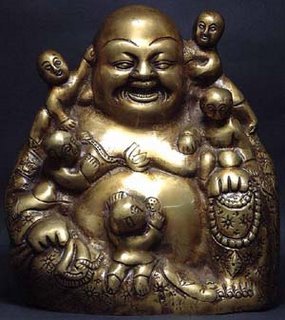The Problem of God
 Do you ever stop and think about how different your life would be if you made just one choice differently? Just one choice?
Do you ever stop and think about how different your life would be if you made just one choice differently? Just one choice?I do. The most important decision I have probably ever made was where to go to college. I know that may seem trivial in comparison to deciding who to marry or when to have children, but those decisions were the direct result of my choice of where to go to school. I agonized over the decision for days. It came down to Tulane and Georgetown. Both schools had offered me the same amount of money in financial aid, and both schools had their advantages and disadvantages. Tulane was more of a party school and Geortown was superior academically. My parents were pushing for Georgetown. They thought I'd be safer at a Catholic school and less likely to stray from their teachings. I waited until the day before the deposit was due to decide and overnighted my enrollment deposit to Georgetown.
Because my father was a Pentecostal preacher, growing up, my whole life revolved around the church. My sisters and I used to sing solos in front of the congregation. The song that I remember most vividly was called "Old Buddha." The song goes, "Well, Old Buddha was a man, and I'm sure that he meant well. But I pray for his disciples, lest they wind up in hell. And I'm sure that Old Mohammed thought he knew the way. But it won't be Hare Krishna we stand before on the Judgment Day." To get the full effect of the song, you have to imagine it being sung by a seven-year-old blonde girl with a deep Southern accent. Of course, we had no idea who Buddha or Mohammed or Hare Krishna were. All we knew was that we were right and they were wrong. We might as well have been singing, "I am right and you are wrong and you are going to hell--even though I don't know a single thing about your religion, culture, or beliefs."
I was in for a rude awakening at Georgetown. Georgetown requires all of its students to take two theology classes and two philosophy classes. Most freshmen, including myself, end up taking a theology class called “The Problem of God.” “The Problem of God” is probably the most appropriately named class I have ever taken. As an introductory theology class, it asked tough questions and challenged every religious belief I had. It introduced me to other religions. It asked questions that I couldn’t answer from both a logical standpoint and a theological standpoint. I grew up completely immersed in the church, but couldn't answer tough questions about my own religion. That class single handedly caused my belief structure to crumble. It was devastating. I remember calling my mom in tears one evening because I was so upset about the class. She simply said, “A faith that isn’t tested isn’t much of a faith at all.” And boy was she right. Other theology and philosophy classes followed. Eventually, I became less frightened of the tough questions and more intrigued by them. The more questions I asked myself, the more answers I came up with on my own, rather than relegating to my religious upbringing. Georgetown was the place where every opinion that I had was challenged and where most of them changed. It was the place where I learned to think critically and to think for myself. My choice of school led to my choice of lifestyle—a lifestyle of careful introspection and independent thought.
Oh the difference one choice can make. I started Georgetown as a conservative Christian. I graduated Georgetown not completely sure what the hell I was, but deeply determined to find out.
If I had chosen differently, I am convinced that my life would be completely different. I would probably be married to someone else and living somewhere else. I would probably be a lawyer instead of a struggling writer. I would probably still believe in creationism and that homosexuality is a sinful choice. And I would probably be happily plodding through my life convinced that when I died there would be a mansion and a feast waiting for me in heaven. All of my most formative experiences would have been completely different.
I guess you could say I'm just one good decision away from being a fundamentalist conservative. If I had not been challenged, and forced to think critically about my world view, I would never have discovered all of the wonderful things I now know about the world.
I would never ask anyone to change their political or religous beliefs because of what I think. But I do ask that anyone and everyone study up and think critically about what they believe. Shouldn't we all be asking those questions? Shouldn't we all be testing ourselves on a regular basis? After all, a faith that isn't tested isn’t much of a faith at all.


<< Home